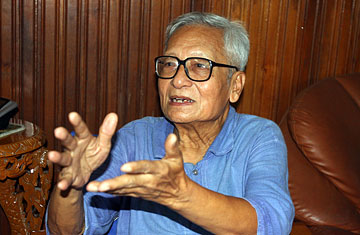
Win Tin, the longest-serving political prisoner in the military-ruled nation, talks with friends and journalists after his release from Insein Prison in Rangoon, Burma, on Sept. 23
He was a man of letters who instilled such fear in Burma's men of arms that he became their longest-serving political prisoner. But on Sept. 22, the day he was finally set free, U Win Tin was just as defiant as on the day of his arrest 19 years ago by Burma's military regime. "I will keep fighting for the emergence of democracy in this country," proclaimed the 79-year-old former journalist, still wearing his blue prison uniform as he spoke to reporters outside the home of a friend in Rangoon.
Win Tin's power to intimidate the highest ranking members of the junta derives from his intellectual prowess. One of the founders of the opposition National League for Democracy, he was viewed by many as the party's chief strategist, as well as a mentor for Aung San Suu Kyi, the Nobel Peace Prize winner who is in her 13th year of house arrest for leading Burma's ongoing pro-democracy movement. The generals believed he "was my puppet master," Suu Kyi once wrote of Win Tin. Bo Kyi Win of the Assistance Association for Political Prisoners in Burma, a Thailand-based exile group, said, "They kept him so long because they were afraid of him."
According to Myanmar Ahlin, a state-run newspaper, Burma's military government released Win Tin and 9,001 other prisoners this week so they could participate in national elections planned for 2010. The polls will be part of the regime's seven-point "Roadmap to Democracy." Burma, also known as Myanmar, has been ruled by a series of repressive military regimes since 1962. Classified by the United Nations as among the worlds least developed countries, the agrarian nation in southeast Asia is still recovered from May's Cyclone Nargis, which killed an estimated 80,000 people and devastated the countrys rice-growing region. Almost none of those released, however, were political prisoners, of which Amnesty International estimates there are about 2100 in the country. Win Tin said he complained to prison officials about being lumped in with common criminals on his historic release, and that he felt sad for those who remained behind. "I did not accept their terms for the amnesty. I refused to be one of 9,002," he said. "They owe me a few years." He added that no conditions had been attached to his release.
Many in Burma's exile community rejected the regime's explanation for the release of Win Tin and a half dozen other political prisoners. "This is a publicity stunt, and the international community should not fall for it," said Soe Aung of the National Coalition of the Union of Burma, an alliance of exile groups. "If they were serious, they would release all political prisoners, including Aung San Suu Kyi." He said the move was intended to relieve international pressure — and more importantly domestic discontent — over the junta's handling of the cyclone relief effort in which outside assistance was at first refused, and then restricted. This week will also mark the first anniversary of protests led by Buddhist monks that were violently suppressed by the military.
In 1996, during one of her brief periods of freedom, Aung San Suu Kyi, in a syndicated newspaper column, wrote that Win Tin's "undoubted ability and his strength made [him] a prime target of those who opposed the democratic cause and in 1989 he became one of the first leaders of the NLD to be arrested. The charge against him involved an unproven telephone conversation with the father of an individual who had been declared a fugitive from the law. Telephone conversations are, in any case, inadmissible as evidence under Burmese law, but the law offers scant protection for those who challenge military rule in Burma." She also noted that Win Tin was kept without sleep and interrogated non-stop for his first three days in prison. "A man of courage and integrity, Win Tin would not be intimidated into making false confessions," she wrote.
Another key aide of Suu Kyi, Win Htein, was also among those released this week. A former military officer, he was imprisoned in 1996 for allegedly meeting with activists who had made a video documenting harsh conditions in the Burmese countryside. He was arrested because the regime "wanted to cut off Suu Kyis ears and eyes," said Soe Aung. But as last year's monk-led uprising showed, voices of dissent are becoming more difficult to silence. Although Win Tin has vowed to continue speaking out and working to end military rule, he is surely aware that the military is capable of revoking his newfound freedom. Another long-serving political prisoner, student leader Min Ko Naing, who was arrested the same year as Win Tin and released in 2004, was re-arrested last year in connection with protests over deteriorating economic conditions last year and is still languishing in prison.
(See photos of Burma's devastation after Cyclone Nargis here.)
